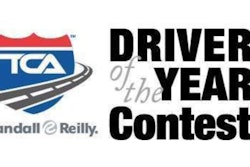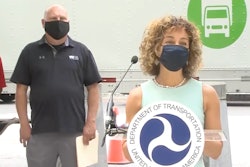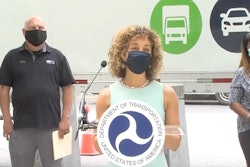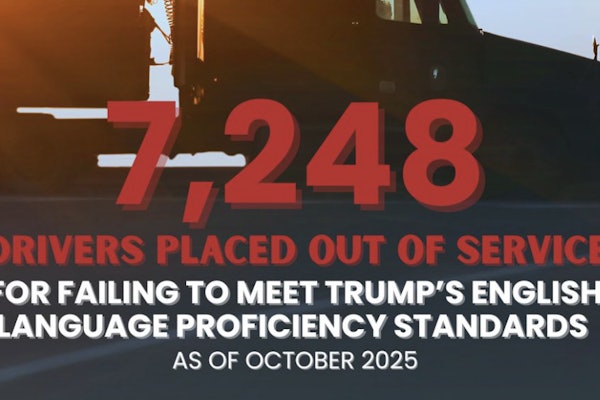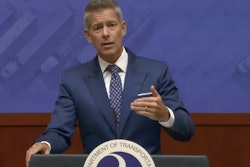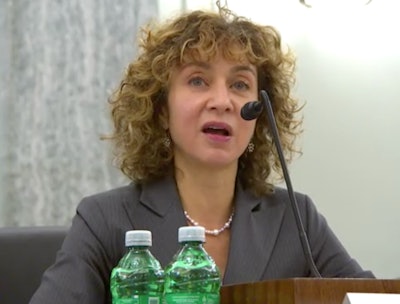
The woman tapped by President Joe Biden to lead the Federal Motor Carrier Safety Administration got one step closer to finally being installed in that position Wednesday, Sept. 22.
Meera Joshi, the deputy administrator of the agency, appeared before the Senate Committee on Commerce, Science, and Transportation. She fielded numerous questions after making an opening statement in which she praised truckers for their work during the COVID-19 pandemic and recent natural disasters. Joshi also vowed to work with committee members to improve highway safety.
 Meera Joshi
Meera Joshi
Joshi also cited the steady increase in highway fatalities since 2009, including more than 800 trucker deaths a year. If confirmed, Joshi said she would "work with this committee to strengthen the safety of the commercial motor vehicle sector. All of us using the nation's roadways are someone's loved ones, and we all deserve to get to where we are going unharmed."
Questioning by members of the committee touched on a variety of issues of concern to the trucking industry including driver pay, congestion at ports, the prospect of allowing younger CDL holders to drive across state lines, and hours of service.
In response to a question from Sen. Deb Fischer (R-Nebraska) about possible increased hours of service flexibility for livestock haulers, Joshi said she plans to visit a livestock hauling operation to see how the loading and unloading process works. She said the agency will consider the challenges of livestock transport with any regulations.
Fischer also asked Joshi about what she called the "extreme fright backlog" the industry is dealing with and the prospect of 18-21-year-old drivers driving for interstate deliveries.
Joshi said that under her leadership, the FMCSA would follow the letter of the for younger drivers as set out in the DRIVE-Safe Act. She detailed the various safety-related issues addressed in the act that creates apprenticeships for younger drivers. She also pointed out the act requires the FMCSA to complete what she called "a very important study" on driver compensation, including paid and unpaid detention time.
The nominee also discussed driver pay when responding to a question from Sen. Amy Klobuchar (D-Minnesota), who cited the backlog of incoming freight at West Coast ports. Joshi said truckers suffer when the time it takes to get into and out of ports (turn time) increases as it has these days. It's estimated there are as many as 60 container ships anchored off the ports of Los Angeles and Long Beach waiting to unload.
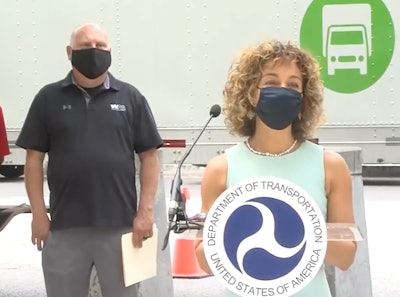 Meera Joshi speaking at a Truck Driver Appreciation Week event in Washington, D.C. recently
Meera Joshi speaking at a Truck Driver Appreciation Week event in Washington, D.C. recently
Joshi said she expects to continue to meet with port operators, trucking companies, and drivers because FMCSA "cannot make informed policy decisions without driver and motor carrier input.”
In his questioning of Joshi, Sen. Ed Markey (D-Massachusetts) also took a swipe at the Trump Administration. He said responses to his inquiries about trucker safety were "woefully insufficient," adding that "truck safety regulators have been asleep at the wheel.”
When Markey asked what Joshi would do to improve the federal government's approach to safe trucking, Joshi listed:
- electronic transfer of license data between states (a rulemaking for which is in the works)
- a provision in a future rulemaking requiring a license downgrade if a positive drug test is submitted to FMCSA’s Drug and Alcohol Clearinghouse, which she said was an "important enforcement tool to get risky drivers off the roads"
- strengthening the agency’s new entrant program
Another safety issue -- distracted driving -- came up during Wednesday's hearing. Joshi said of it, “It's one of the most heartbreaking incidents because it's preventable. It takes a quick decision not to use your phone while you're driving, to put on the return text message that says, 'do not disturb me, I'm driving, I will not respond.' It's those slight changes that make huge differences.
Members of the committee have 72 hours from the close of the hearing to submit questions in writing to Joshi and the other nominees. Joshi and others then have a week to respond. The committee would then vote whether to send the nominations to the entire Senate for a vote.
Joshi was among four DOT nominees at the hearing Wednesday, along with Victoria Marie Baecher Wassmer, nominee for DOT Chief Financial Officer; Mohsin Raza Syed, nominee for DOT's assistant secretary of government affairs; and Amitabha Bose, nominee for Federal Railroad Administrator.






